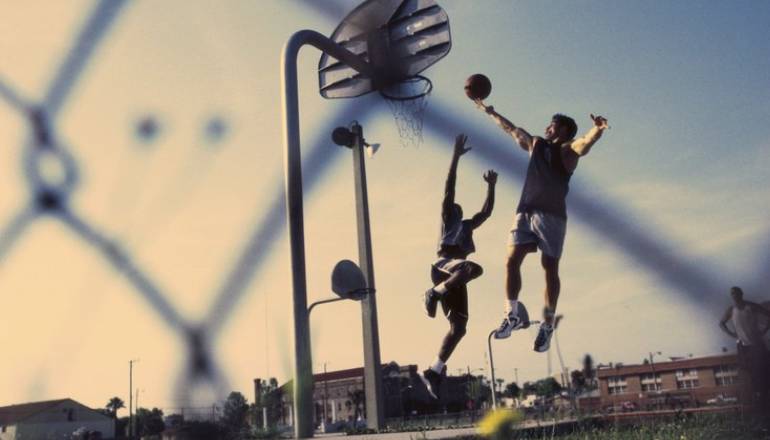What’s the Difference Between Indoor Soccer Shoes and Basketball Shoes?
There are many factors to consider when choosing the right shoes for your sport. For indoor soccer and basketball, two popular choices, you’ll want to think about the different features of each type of shoe to decide which is the best for you.
What’s the difference between indoor soccer shoes and basketball shoes? Indoor soccer shoes are designed for quick movements on a smooth surface, while basketball shoes have more cushioning and support for lateral movements. Consider your playing style and the surface you’ll be playing on to make the best choice for you.
Can YOU Wear Basketball Shoes on Turf?
You can wear basketball shoes on turf, but it’s not recommended. Turf is a lot harder than concrete, so your shoes will wear down faster. You might also slip and fall more often since the turf is less grippy than the concrete.
Turf shoes are designed to provide traction and stability on artificial surfaces, so they might be a better option. However, basketball shoes on turf may not provide the best grip and traction. If you’re playing on turf that is particularly slippery, you may want to consider wearing cleats or turf shoes instead.
Basketball shoes are designed for playing on a hardwood court, so they might not be the best choice for playing on turf. Turf shoes are a better option because they have small, rubber cleats that provide traction on the synthetic surface. However, if you don’t have turf shoes, you can wear your basketball shoes on turf as long as you take care of them afterward.
Can Indoor Soccer Shoes be Used for Basketball?
Many people are familiar with the game of soccer. It is a popular sport that is played all over the world. Soccer is typically played outdoors on a grass field, but it can also be played indoors on a synthetic surface. Indoor soccer shoes are designed to provide traction and stability on these types of surfaces.
Basketball is another sport that is popular all over the world. Unlike soccer, basketball is typically played indoors on a hardwood court. Basketball shoes are designed to provide traction and stability on these types of surfaces. So, the answer to the question is yes, indoor soccer shoes can be used for basketball. However, it is important to note that they may not provide the same level of traction and stability as basketball shoes.
Yes, indoor soccer shoes can provide good support and traction, and can help you move quickly and confidently on the court. However, there are a few things to keep in mind when choosing indoor soccer shoes for basketball.
You should make sure the shoes fit well and provide adequate support for your feet. If the indoor soccer shoe is with good traction to prevent slipping on the court, you can also try. Finally, choose a shoe that is comfortable and allows you to move freely.
The main difference between indoor soccer shoes and basketball shoes is the level of ankle support they provide. Indoor soccer shoes have higher tops that wrap around the ankle to provide extra support, while basketball shoes have lower tops and provide less ankle support.
Can you Play Basketball in Futsal Shoes?
In fact, many professional players actually prefer to use futsal shoes when playing on a hardwood court. Futsal shoes are designed to provide excellent traction and support, which helps players make quick cuts and sudden stops. They also have a lower profile than traditional basketball shoes, which gives players a better feel for the floor. And because they are not as bulky, futsal shoes can help players move more quickly and efficiently on the court. So if you are looking for a versatile shoe that can help you perform your best in both basketball and futsal, consider investing in a pair of futsal shoes.
Futsal shoes are designed to provide good traction and support on indoor surfaces, so they can definitely work for playing basketball on an indoor court. However, keep in mind that futsal shoes are not typically as durable as basketball shoes, so they may not last as long if you use them for both sports.
First of all, futsal shoes are designed for use on hard surfaces, so they may not provide the same level of traction on a basketball court. Secondly, futsal shoes tend to be lower to the ground than basketball shoes, so you may not have the same range of motion. Finally, futsal shoes are typically smaller and lighter than basketball shoes, so you may want to size up if you’re planning on playing in them.
What Can Indoor Soccer Shoes Be Used For?
Indoor soccer shoes are a type of footwear designed specifically for playing indoor soccer. There are many different types of soccer shoes on the market, each designed for a specific playing surface. Indoor soccer shoes are designed for use on indoor soccer courts, which are usually made of wood, artificial turf, or concrete. Indoor soccer shoes have a flatter sole than outdoor soccer shoes, and they often have small rubber studs on the bottom to provide traction. So, what can indoor soccer shoes be used for?
In addition to playing indoor soccer, they can also be used for playing other sports on indoor courts, such as basketball, volleyball, or handball. They can also be worn as casual shoes, thanks to their stylish designs. So if you’re looking for a versatile shoe that can be used for multiple purposes, indoor soccer shoes are a great option.
While indoor soccer shoes are not required for play, they can provide players with better traction and support. This can help to improve your game and prevent injuries. If you’re considering purchasing a pair of indoor soccer shoes, here are a few things to keep in mind.
First, consider the type of surface you’ll be playing on most often. Indoor soccer shoes with rubber soles are typically best for wooden floors, while those with synthetic soles perform well on turf.
Second, think about the level of support and cushioning you need. If you have any foot or ankle problems, it’s important to choose a shoe that offers good arch support and shock absorption.
Finally, don’t forget to factor in style! While function is important, you also want a shoe that looks good and fits your personal taste. With so many different brands and styles available, there’s sure to be an indoor soccer shoe that’s perfect for you.
What is Different About Indoor Soccer Shoes?
If you’re a soccer player, you know that there are different types of shoes for different types of surfaces. You wouldn’t wear cleats on turf, for example. So what’s the difference between indoor soccer shoes and regular sneakers? Here’s a quick rundown.
Indoor soccer shoes are designed to provide traction and support on indoor surfaces, such as polished wood or tile. They typically have a flatter sole than outdoor soccer shoes, which helps players move quickly and change direction easily. Some indoor soccer shoes also have special features, such as extra padding around the ankle to protect against injuries.
Indoor soccer shoes also have less tread, so you don’t have to worry about slipping. They also tend to be lighter weight and have less padding than outdoor soccer shoes, which helps with agility and speed on the court.
So if you’re looking to pick up a pair of indoor soccer shoes, keep these things in mind. They’ll help you make the best choice for your game.
Wrap Up
Indoor soccer shoes are designed to provide traction and stability on indoor surfaces. They typically have a flatter sole and less padding than other types of soccer shoes. This allows you to move quickly and change directions easily.
Basketball shoes, on the other hand, are designed for outdoor use. They have a thicker sole and more padding to protect your feet from the hard surface. Basketball shoes also have good traction to help you make quick stops and starts. So, which one should you wear? It depends on where you’ll be playing. If you’re playing indoors, go for indoor soccer shoes. If you’re playing outdoors, basketball shoes are a better choice.
Related posts
